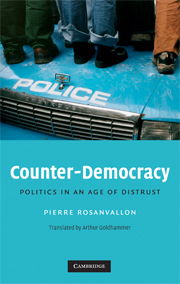Book contents
9 - Almost legislators
Published online by Cambridge University Press: 24 May 2010
Summary
The democratic jury
The people-as-judge also existed in another form: the jury. The history of the institution makes this clear. During the Middle Ages the jury was reintroduced in Europe in order to resolve disputes between knights peacefully, without recourse to the previously widespread practice of judicial combat. Judgment by a small group of peers seemed to be the best way of achieving the desired result. With the rise of the royal courts, however, the institution entered a period of decline. The modern jury did not emerge until the middle of the eighteenth century. Enlightenment thinkers asked how the frequency of judicial error could be reduced. In a period of growing sensitivity to human rights, errors of justice shocked the conscience. Many of the great minds of the age wrote about the issue, including Beccaria, Blackstone, Condorcet, and Voltaire, to mention only the most celebrated. The question to which all of these writers addressed themselves was this: How can judges, fallible human beings, render a judgment with the least likelihood of error? Academies across Europe organized competitions on the subject. Everywhere the answer was the same: the jury. For instance, Blackstone marveled at “how admirably this constitution [i.e., institution] is adapted and framed for the investigation of truth, beyond any other method of trial in the world.” Twelve people deliberating the facts of the case are less likely to be wrong than one person deliberating alone.
- Type
- Chapter
- Information
- Counter-DemocracyPolitics in an Age of Distrust, pp. 214 - 226Publisher: Cambridge University PressPrint publication year: 2008



